
CHROMOSOME RESEARCH
Scope & Guideline
Advancing genetic knowledge through groundbreaking research.
Introduction
Aims and Scopes
- Chromosomal Structure and Dynamics:
Research exploring the physical and functional organization of chromosomes, including studies on chromatin structure, chromosome territories, and the dynamic changes during the cell cycle. - Chromosomal Evolution and Diversity:
Investigation into the evolutionary processes that shape chromosome structure and number across species, including the study of polyploidy, chromosomal rearrangements, and satellite DNA evolution. - Aneuploidy and Chromosomal Instability:
Focus on the mechanisms and consequences of chromosomal instability and aneuploidy, particularly in relation to cancer biology and developmental disorders. - Genomic Technologies and Methodologies:
Utilization of advanced genomic and imaging techniques, such as Hi-C sequencing, CRISPR/Cas9, and super-resolution microscopy, to study chromosome behavior and interactions. - Comparative Cytogenomics:
Comparative analyses of chromosomes across different species to understand their evolutionary relationships, functional adaptations, and species-specific characteristics. - Application in Human Health and Disease:
Research that connects chromosomal studies with human health, including genetic disorders, cancer genomics, and implications for prenatal diagnosis and therapy.
Trending and Emerging
- Chromosomal Instability in Cancer:
An increasing focus on the role of chromosomal instability in cancer progression and treatment resistance highlights the importance of understanding how chromosomal changes contribute to tumor biology. - Technological Innovations in Chromosome Analysis:
Emerging methodologies such as Hi-C sequencing and advanced imaging techniques are being utilized to explore chromosome architecture and dynamics, enabling deeper insights into chromosomal functions. - Genome Assembly and Chromosome-Level Studies:
Research that emphasizes high-quality genome assemblies and chromosome-level analyses is gaining traction, reflecting a trend towards understanding genome organization in a more comprehensive manner. - Functional Studies of Chromosomal Elements:
There is a growing interest in the functional roles of specific chromosomal regions, including centromeres and telomeres, particularly in relation to their impact on cell division and genetic stability. - Integration of Chromosomal and Epigenetic Research:
The intersection of chromosomal studies with epigenetics, particularly how epigenetic modifications influence chromosome behavior and gene expression, is becoming a prominent area of research.
Declining or Waning
- Historical Perspectives on Chromosomal Studies:
Papers that provide historical insights or retrospective analyses of chromosomal research have become less frequent, as the field increasingly prioritizes novel findings and contemporary methodologies. - Basic Descriptive Cytogenetics:
Studies focused solely on basic chromosome counting and morphological descriptions have waned, likely due to the rise of more sophisticated genomic approaches that provide deeper insights into chromosome function and evolution. - Static Imaging Techniques:
The use of traditional imaging methods (e.g., light microscopy for chromosome analysis) has diminished as newer, more precise imaging technologies (like super-resolution microscopy) gain prominence. - Non-Model Organism Studies:
Research focusing on non-model organisms has seen a decrease, possibly as funding and interest shift towards well-established model organisms that facilitate genetic manipulation and detailed study. - General Reviews of Chromosome Biology:
General review articles discussing broad aspects of chromosome biology are less common, as the journal increasingly favors targeted reviews that focus on specific, cutting-edge topics.
Similar Journals
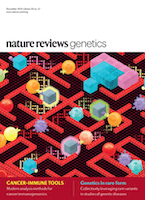
NATURE REVIEWS GENETICS
Transforming Knowledge into Genetic Understanding.NATURE REVIEWS GENETICS, published by NATURE PORTFOLIO, stands as a leading journal in the field of genetics, boasting a remarkable reputation reflected in its Q1 ranking across multiple categories including Genetics, Clinical Genetics, and Molecular Biology. With an impressive percentile of 99th in both Genetics and Clinical Genetics, as well as a solid rank in Molecular Biology, this journal is pivotal for researchers, professionals, and students alike who seek to stay informed on the latest advancements and comprehensive reviews in genetic research. The journal's scope encompasses a wide array of topics, providing in-depth insights from fundamental genetic principles to clinical applications, underscoring its importance in bridging basic science and medical practice. Though not an open-access publication, it remains accessible through various academic institutions, enhancing its reach and influence within the scientific community. With publication years spanning from 2000 to 2024, NATURE REVIEWS GENETICS continues to shape the future of genetics research and education.
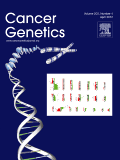
Cancer Genetics
Unlocking the Secrets of Cancer Through GeneticsCancer Genetics is an esteemed peer-reviewed journal dedicated to advancing the field of cancer research through the lens of genetics. Published by Elsevier Science Inc and available in both print (ISSN: 2210-7762) and online (E-ISSN: 2210-7770), this journal aims to provide a platform for the dissemination of high-quality studies that unravel the genetic underpinnings of cancer. Since its inception in 2011, Cancer Genetics has become a significant resource for researchers, professionals, and students with a shared interest in understanding the intricate relationship between genetics and oncogenesis. With an impact factor that reflects its influence, the journal has maintained a Q3 ranking in Cancer Research, Genetics, and Molecular Biology as of 2023, indicating its growing importance in these fields. Additionally, the journal offers open access options to ensure that crucial findings are easily accessible to the global research community. By bridging the gap between genetics and cancer studies, Cancer Genetics plays a pivotal role in fostering innovation and collaboration among scientists and clinicians striving to improve cancer diagnosis and treatment.
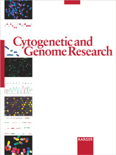
CYTOGENETIC AND GENOME RESEARCH
Advancing the frontiers of cytogenetics and genomics.CYTOGENETIC AND GENOME RESEARCH is a pivotal journal dedicated to the exploration of cytogenetics, genomics, and their applications within clinical genetics and molecular biology. Published by KARGER in Switzerland, this journal aims to foster comprehensive discussions and disseminate impactful research from diverse fields related to genetics. It operates under an open access model, ensuring that researchers, professionals, and students can easily access and contribute to the latest findings. With coverage spanning from 1962 to 2024, CYTOGENETIC AND GENOME RESEARCH continues to serve as a vital resource, despite its current categorization in the Q4 quartile across Genetics and Molecular Biology. It provides an avenue for advancing the understanding of genomic mechanisms and their implications for human health. The journal encourages submissions that delve into cutting-edge methodologies, data interpretation, and theoretical frameworks, thereby playing a crucial role in the advancement of genetic research and its clinical applications.
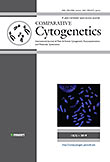
Comparative Cytogenetics
Fostering Collaboration in Cutting-edge GeneticsComparative Cytogenetics, an esteemed journal published by PENSOFT PUBLISHERS, is a pivotal resource in the fields of animal science, biotechnology, genetics, insect science, and plant science. Since its inception as an Open Access journal in 2009, it has significantly contributed to the democratization of scientific knowledge, allowing researchers and students across the globe to access cutting-edge developments in cytogenetics. With an impressive range of articles published from 2010 to 2024, this journal has achieved a commendable impact within the academic community, earning a Q3 ranking in Animal Science and Zoology, Biotechnology, and Insect Science, as well as a Q4 ranking in Genetics, indicating its growing influence. Its Scopus rankings reflect a solid standing, with notable percentiles showcasing its relevance across diverse biological sciences. Located in Sofia, Bulgaria, Comparative Cytogenetics serves not only to disseminate research but also to foster collaboration in understanding cytogenetic dynamics, making it an essential platform for professionals, researchers, and students alike.
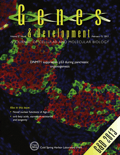
GENES & DEVELOPMENT
Advancing Knowledge in Developmental Biology and GeneticsGENES & DEVELOPMENT, published by COLD SPRING HARBOR LAB PRESS, stands as a premier journal in the fields of Developmental Biology and Genetics, boasting a remarkable impact factor that reflects its prestigious position in the academic community—ranking Q1 in both disciplines as of 2023. Since its inception in 1987, this journal has been at the forefront of disseminating cutting-edge research, effectively bridging the gap between laboratory breakthroughs and their applications in health and disease. Researchers and professionals rely on GENES & DEVELOPMENT for its rigorous peer-review process and its commitment to promoting innovative studies that unravel the complexities of gene functions and developmental processes. With Scopus rankings placing it in the top percentile among its peers, this journal serves as a vital resource for students and established scientists alike, aspiring to expand their knowledge and contribute to the ever-evolving landscape of genetic and developmental research.

GENOME RESEARCH
Illuminating the Pathways of Molecular BiologyGenome Research, published by Cold Spring Harbor Laboratory Press, stands as a premier journal in the field of genetics, featuring rigorous peer-reviewed research that explores the complexities of genome organization and function. With an impressive Q1 ranking in both Genetics and Clinical Genetics according to the 2023 category quartiles, this journal effectively bridges the gap between fundamental genetic science and its clinical applications. Its significance is further highlighted by its Scopus rankings, where it ranks #6 out of 99 in Clinical Genetics and #27 out of 347 in Biochemistry, Genetics, and Molecular Biology, showcasing its broad influence and access to cutting-edge discoveries. Researchers and professionals can look forward to a diverse array of articles that cover genomic technologies, bioinformatics, and translational genomics. Although not currently open access, the wealth of information available in each issue makes it an invaluable resource for anyone engaged in genetic research and applications.

CHROMOSOMA
Exploring Genetic Landscapes Since 1939CHROMOSOMA is a prestigious journal dedicated to advancing the field of genetics, published by Springer in Germany. With an ISSN of 0009-5915 and an E-ISSN of 1432-0886, this journal has been a cornerstone in the publishing landscape since its inception in 1939, serving as a critical resource for researchers and professionals interested in the intricacies of chromosomal biology. Although it operates on a subscription basis, the journal's rigorous peer-review process ensures the dissemination of high-quality research findings. With a commendable Q2 ranking in both genetic and clinical genetics categories as of 2023, CHROMOSOMA aims to bridge theoretical concepts with practical applications in medicine and biology. Researchers will appreciate its relevance, as indicated by its Scopus ranks and integration of diverse topics ranging from molecular genetics to clinical implications. By fostering collaboration and knowledge-sharing among scholars, CHROMOSOMA continues to shape the future of genetic research.
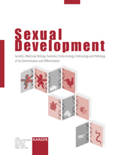
Sexual Development
Pioneering Research in Embryology and EndocrinologySexual Development is a distinguished peer-reviewed journal published by KARGER, focusing on the intricate biological processes underpinning sexual differentiation and development across various organisms. With an ISSN of 1661-5425 and an E-ISSN of 1661-5433, the journal has established itself as a vital resource for researchers in the fields of Developmental Biology, Embryology, and Endocrinology. Hailing from Basel, Switzerland, this journal is committed to disseminating high-quality research that explores the complexities of sexual development, including genetic, environmental, and hormonal influences. With considerable recognition in the academic community, it currently holds a Q2 ranking in Embryology and Q3 rankings in both Developmental Biology and Endocrinology, Diabetes and Metabolism. Researchers and professionals are encouraged to contribute to and access its wealth of knowledge, thereby advancing understanding and discovery in this critical area of biological research. The journal's continuous publication since 2006 reflects its dedication to evolving the discourse and knowledge base surrounding sexual development, making it an essential platform for scholars in the field.
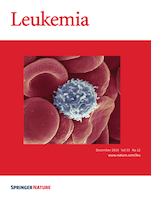
LEUKEMIA
Advancing the Frontiers of Hematology and OncologyLEUKEMIA, published by SpringerNature, is a premier journal in the field of hematology and oncology, with ISSN 0887-6924 and E-ISSN 1476-5551. Established in 1987, this esteemed publication serves as a critical platform for disseminating groundbreaking research and comprehensive reviews on the pathophysiology, diagnosis, and treatment of leukemia and related hematological disorders. With a distinguished impact, it holds a top-tier status in several categories, including Q1 rankings in Anesthesiology and Pain Medicine, Cancer Research, Hematology, and Oncology for 2023. The journal is globally recognized for its rigorous peer-review process and is highly regarded among academia, evidenced by its impressive Scopus rankings—7th in Hematology and 24th in Oncology. Researchers, clinicians, and students alike will benefit from the rich content that this journal offers, making it an invaluable resource in the fight against leukemia. The main objective of LEUKEMIA is to advance knowledge and encourage further innovations within the field, ensuring that vital insights reach practitioners and researchers around the world.

MUTATION RESEARCH-FUNDAMENTAL AND MOLECULAR MECHANISMS OF MUTAGENESIS
Advancing Knowledge in Mutagenesis and HealthMUTATION RESEARCH - FUNDAMENTAL AND MOLECULAR MECHANISMS OF MUTAGENESIS is a premier peer-reviewed journal published by Elsevier, dedicated to advancing the understanding of mutagenesis and its broader implications in genetics, health, and molecular biology. With an impressive converged publication history from 1964 to 2024, this journal provides a vital platform for the dissemination of high-quality research findings, contributing significantly to the field's knowledge base. Indexed in Scopus, it holds a Category Quartile ranking of Q3 in Genetics and Q2 in Health, Toxicology, and Mutagenesis, further underscoring its relevance and stature. Access options are available, catering to a diverse audience of researchers, professionals, and students eager to stay informed on the latest developments in mutagenesis research. By bridging experimental studies and theoretical frameworks, the journal plays a crucial role in exploring the fundamental mechanisms underlying genetic mutations and their effects on human health and the environment.